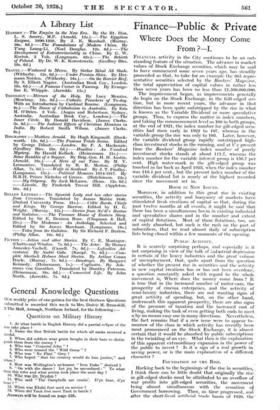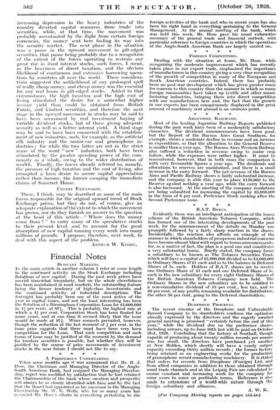Finance-Public & Private
Where Does the Money Come From ?-I.
FINANCIAL activity in the City continues to be an out- standing feature of the situation. The advance in market values of Stock Exchange securities, which may be said to have commenced some seven years ago, has steadily proceeded so that, to take for an example the 865 repre- sentative securities selected by the Bankers' Magazine, the total appreciation of capital values in rather less than seven years has been no less than £1,500,000,000.
The improvement began, as improvements generally do begin on the Stock Exchange, in the Gilt-edged sec- tion, but in more recent years, the advance in that direction has been quite outstripped by the rise in what is known as the Variable Dividend or more speculative groups. Thus, to express the matter in index numbers, and taking the commencement level as 100 in both groups, at the end of 1921, the index number for gilt-edged secu- rities had risen early in 1922 to 107, whereas in the variable group the rise was only to 103. Later, however, the variable dividend group rapidly outstripped high- class investment stocks in the running, and at ee present time the Bankers' Magazine index number of purely investment stocks stands at about 111.7, whereas the index number for the variable interest group is 156.7 per cent. High water-mark in the gilt-edged group was touched as far back as April 1928, when the index number was 116.4 per cent., but the present index number of the variable dividend list is nearly at the highest recorded since the movement set in.
BOOM IN NEW ISSUES.
Moreover, in addition to this great rise in existing securities, the activity and buoyancy of markets have stimulated fresh creations of capital so that, during the past twelve months at all events, it might be said that. there has been a simultaneous boom in existing industrial and speculative shares and in the number and extent. of capital flotations. Most of these flotations, too, are, not only absorbed, but such is the rush on the part of subscribers, that we read almost daily of subscription . lists being closed within a few moments of the opening.
PUBLIC ACTIVITY.
It is scarcely surprising perhaps, and especially is it not surprising in view of the talk of industrial depression in certain of the heavy industries and the great volume of unemployment, that, quite apart fro-n.1 the question of whether the present rise in securities and the activity in new capital creations has or has not been overdone, a question constantly asked with regard to the whole movement is, Where does the money come from ? It is true that in the increased number of motor-cars, the prosperity of cinema enterprises, and the activity of semi-luxury industries, there are not wanting signs of great activity of spending, but, on the other hand, underneath this apparent prosperity, there are also signs of the pressure of taxation and the increased cost of living, making the task of even getting both ends to meet a by no means easy one in many directions. Nevertheless, the fact remains that if a new issue were to appear to- morrow of the class in which activity has recently been most pronounced on the Stock Exchange, it is almost certain that it would be absorbed by public subscriptions ' in the twinkling of an eye. What then is the explanation of this apparent extraordinary expansion in the power of the public to invest ? Is it a sign of a real growth in saving power, or is the main explanation of a different character ?
FOUNDATION OF THE RISE.
Harking back to the beginnings of the rise in securities, I think there can be little doubt that originally the rise in gilt-edged stocks must be attributed to an overflow of war profits into gilt-edged securities, the movement being almost simultaneous with the cessation of Government borrowing. Then, as time progressed, and after the short-lived artificial trgde boom of 1920. the • increasing depression in the - heavy industries of -the Country diverted capital -resources —from trade into securities, while, at that time, the movement was probably accentuated by the flight from certain foreign currencies, the money sent here finding its way into the security market. The next phase in the situation was a pause in the upward movement in gilt-edged securities, that pause being probably. due to a recognition of the extent of the forces operating to restrain any great rise in fixed interest stocks, such forces, I mean, as the heaviness of direct taxation, and the obvious likelihood of continuous and extensive borrowing opera- tions by countries all over the world. These considera- tions suggested the unlikelihood of any prolonged spell of really cheap money, and cheap money was the essential for any real boom in gilt-edged stocks. Added to that circumstance, the high taxation and the high cost of living stimulated the desire for a somewhat higher income yield than could be obtained from British - Funds, and kindred securities, and therefore the next stage in the upward movement in stocks may be said to have been occasioned by real investment buying of variable dividend stocks, but of those giving adequate security as well as a better interest yield. A third stage may -be said to have been connected. with the establish- ment of new industries,.such, for example, as the artificial silk - industry and the motor-car and gramophone in- dustries ; for while the two latter are not in the strict Sense _of the word " new " industries, both have been stimulated by the greater spending .pOwer of the com- munity as a whole, owing to the wider distribution of wealth. Finally, the forces already referred to, namely, the pressure of high taxation and the cost of living, also prompted a keen desire to secure capital appreciation rather than inconie, the forMer escaping the immediate
claims of Somerset House. - CREDIT EXPANSION.
These, I think, may be described as some of the main forces responsible for the original upward trend of Stock Exchange prices, but they do not, of course, give an adequate explanation of the extent to which the movement has grown, nor do they furnish an answer to the question at the head of this article—" Where does the money come from ? " to carry many of the speculative stocks to their present level, and to account for the great. absorption of new capital running every week into many millions of pounds.- I propose, therefore, next week, to deal with this aspect of the problem.
ARTHUR W. KIDDY.































































 Previous page
Previous page